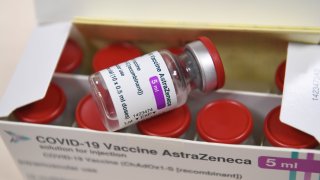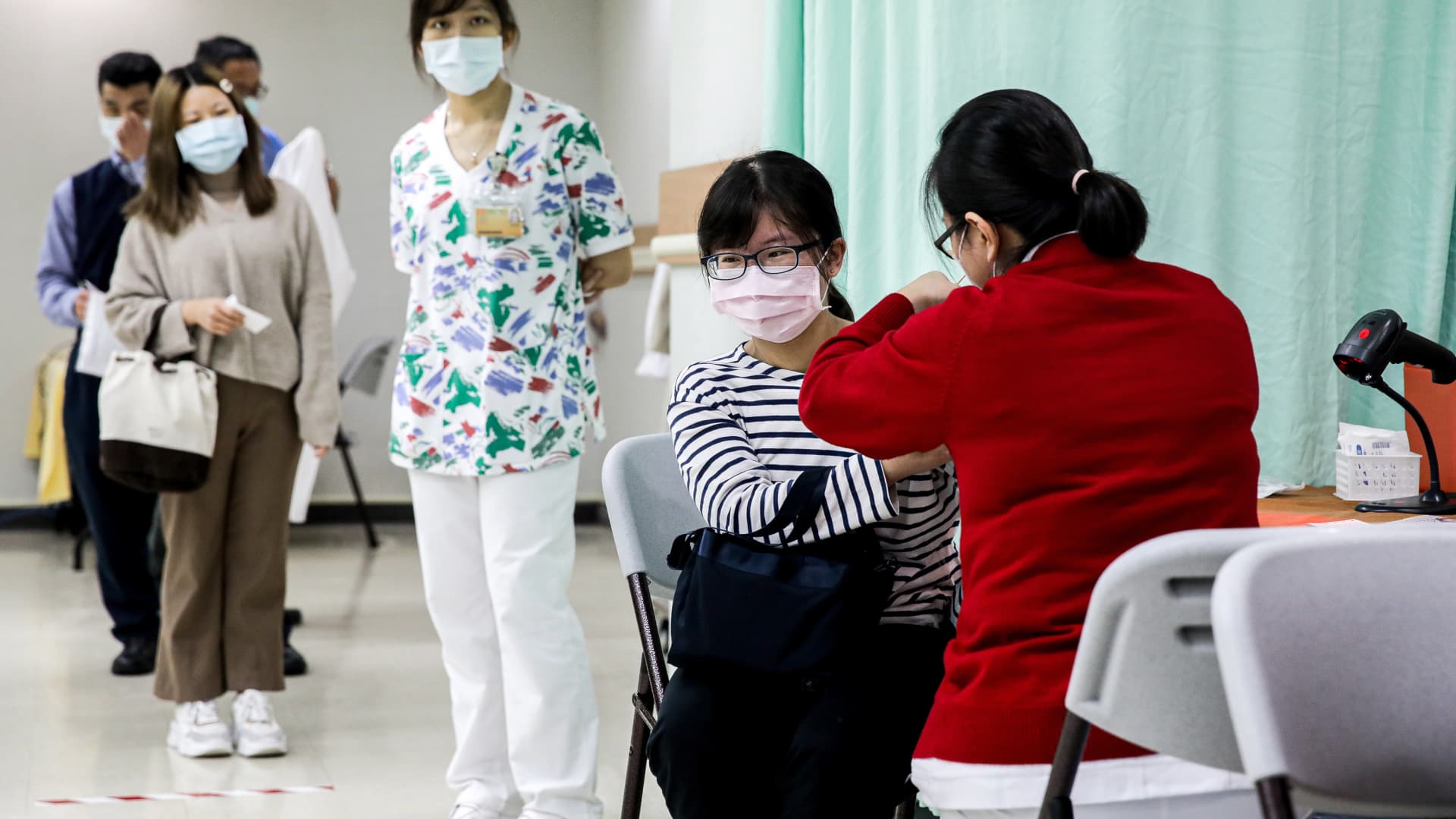
- The safety and efficacy analysis of the vaccine was based on 32,449 participants in a phase 3 trial.
- The results come shortly after several countries temporarily suspended use of the shot following reports of blood clots in some vaccinated people.
- AstraZeneca said an independent data safety monitoring board identified no safety concerns related to the shot.
LONDON — The findings of a large U.S. trial have shown that the coronavirus vaccine developed by AstraZeneca and the University of Oxford is 79% effective in preventing symptomatic illness and 100% effective against severe disease and hospitalization.
The safety and efficacy analysis of the AstraZeneca vaccine, published Monday, was based on 32,449 participants across 88 trial centers in the U.S., Peru and Chile.
Get top local stories in Southern California delivered to you every morning. Sign up for NBC LA's News Headlines newsletter.
Data from the late-stage human trial study reaffirms that the Oxford-AstraZeneca vaccine is safe and highly effective.
By comparison, Moderna's vaccine has been found to be more than 94% effective in preventing Covid and Pfizer-BioNTech's vaccine was found to be 95% effective.
AstraZeneca said it will continue to analyze the data and prepare for the primary analysis to be submitted to the U.S. Food and Drug Administration for emergency use authorization in the coming weeks.
Money Report
The results come shortly after several countries temporarily suspended the use of the shot following reports of blood clots in some vaccinated people. Health experts sharply criticized the move, citing a lack of data, while analysts expressed concern about the impact on vaccine uptake as the virus continues to spread.
Germany, France, Italy and Spain are among those to have resumed use of the Oxford-AstraZeneca vaccine after Europe's drug regulator said its initial investigation of possible side effects concluded the shot is safe and effective.
The World Health Organization and the International Society on Thrombosis and Hemostasis have recommended that countries continue to use the Oxford-AstraZeneca vaccine.
AstraZeneca said in a release Monday that an independent board identified no safety concerns related to the shot. It also conducted a specific review of blood clots as well as cerebral venous sinus thrombosis, an extremely rare blood clot in the brain, with the help of an independent neurologist.
The data safety monitoring board "found no increased risk of thrombosis or events characterised by thrombosis among the 21,583 participants receiving at least one dose of the vaccine. The specific search for CVST found no events in this trial."
AstraZeneca to file for emergency use next month
"We are thrilled by the results we have disclosed this morning," Ruud Dobber, executive vice president of AstraZeneca's biopharmaceuticals business unit, told CNBC's "Squawk Box" on Monday.
"The plan is to file in the first half of April for the emergency use authorization and, of course, then it is in the hands of the FDA how fast they can decide about the approval. Assuming that the approval will take place in a fast way, we hope to deliver 30 million doses instantly after the EUA for Americans to get vaccinated," Dobber said.

When asked how AstraZeneca would tackle the prospect of lingering safety concerns following reports of blood clots in some vaccinated people, Dobber replied: "As always, and I think I speak on behalf of all manufacturers, patient safety is our number one priority."
"It was very pleasing to see that even with a magnifying glass the data safety monitoring board didn't see any imbalance between the vaccinated group and the placebo group. So, that gives us a lot of confidence."
Shares of AstraZeneca traded up 2% during Monday trading in London.
'Much-needed' additional vaccination option
"The U.S. regulatory authorities are reluctant, even in a pandemic, to rely totally on data obtained outside the U.S., so this trial was done to provide convincing evidence of efficacy and safety in a sufficiently large number of U.S. patients," said Stephen Evans, professor of pharmacoepidemiology at the London School of Hygiene & Tropical Medicine.
"This is good news for the global community, and one hopes that any political statements around this good news are avoided," Evans said.
Among the participants in the interim analysis, roughly 20% were 65 or older, while approximately 60% had comorbidities associated with an increased risk for progression of severe Covid, such as diabetes or cardiac disease.
The AstraZeneca-led phase 3 trial included two doses of the Covid vaccine administered at a four-week interval.
The pharmaceutical giant said previous trials had shown an extended interval of up to 12 weeks demonstrated greater efficacy, suggesting an interval longer than four weeks could increase effectiveness and accelerate the number of people who can receive their first dose.
Dr. Ann Falsey, professor of medicine at University of Rochester School of Medicine and co-lead principal investigator for the trial, said: "This analysis validates the AstraZeneca COVID-19 vaccine as a much-needed additional vaccination option, offering confidence that adults of all ages can benefit from protection against the virus."
AstraZeneca said the shot was well tolerated and its effectiveness was found to be consistent across ethnicity and age.
The vaccine was 80% effective in preventing Covid in participants age 65 and older.
"These results add to the growing body of evidence that shows this vaccine is well tolerated and highly effective against all severities of COVID-19 and across all age groups," said Mene Pangalos, executive vice president of BioPharmaceuticals R&D at AstraZeneca.
"We are confident this vaccine can play an important role in protecting millions of people worldwide against this lethal virus."






